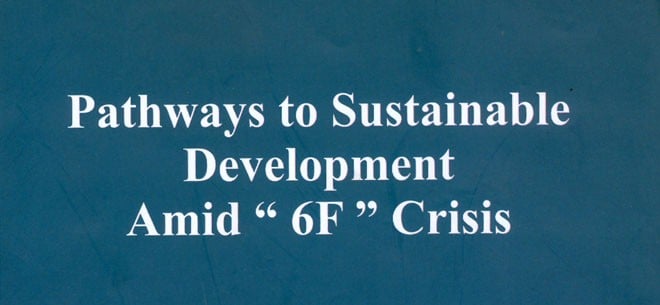
A critical analysis of the fiscal, food, fuel, frontiers, fragility of climate and functional democracy crisis

Sifting through the shelves of a book store, one sometimes comes across a book which is a compilation of articles. That can be putting together of various articles on different topics by the same author, even if there is little or no link between the write-ups. But there are a few exceptions, of course.
One is certainly "Pathways to Sustainable Development…." Though it is also a compilation of various articles dating back from 2005 to the recent times, they share the same context and forcefully complement one another.
That the articles have appeared in mainstream English dailies, mainly The News, over the last roughly one decade, gives the reader an opportunity to see the issues, such as the food and fuel crises, in their proper historical context and connect the dots.
As the cover of the book explains, the book is "a critical analysis of the fiscal, food, fuel, frontiers, fragility of climate, and functional democracy crisis." The diagram on the title further shows how all the crises stem from factors that are related to the whole picture of the country’s economic status.
The preface of the book sets the tone as it explains what sustainable development is, touching on the millennium development goals and their centrality to the development of the third word, and then focusing on the significance of the common people and their participation for the solution of their problems.
Articles under the head of "fiscal crisis" throw ample light on the loopholes in our fiscal policies, unrealistic budget estimations, and seeing more taxes as the only panacea to make up for the budget deficit.
The next chapter on food crisis broadly outlines how a combination of inflation, bad agricultural practices, and natural disasters can make us food insecure. It also looks into how agriculture can play a role in the development and economic well-being of a nation.
The segment under "frontiers crisis" takes a critical look at the bumpy road of relations between India and Pakistan -- the two nuclear-armed neighbours. While the articles in this section openly point to the hindrances in forming friendly relations between the two nations, they also address the issues head on, giving suggestions and enumerating the political, economic, and social benefits for the two countries and the whole South Asian region. This chapter also has an article on SAARC which mentions the causes of failure of this platform and its importance for each and every country in the region.
There are two more sections in the book which are extremely important. One is the crisis of functional democracy while the other highlights lip-service we are paying to the reality of climate change. The chapter on the functional democracy crisis sums up the gist of the matter -- the issue of civil-military relationship and the need to revise it.
The section on climate change should be enough to warn the policy makers as well as the individuals of this country of the cost of neglecting climate change, which is already happening at a fast speed.
This can be an essential reference book for students as well as general readers interested in understanding issues with clarity and a sense of history.